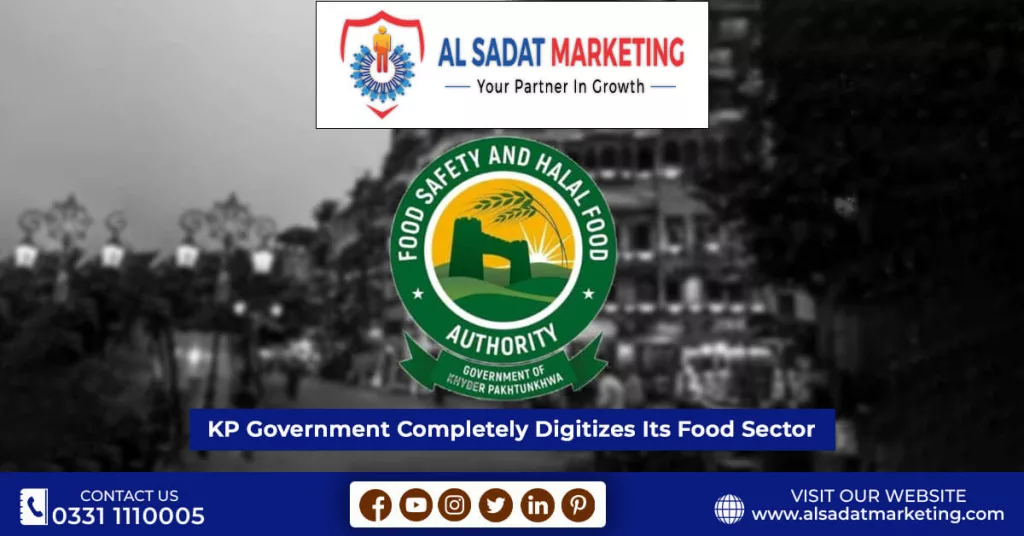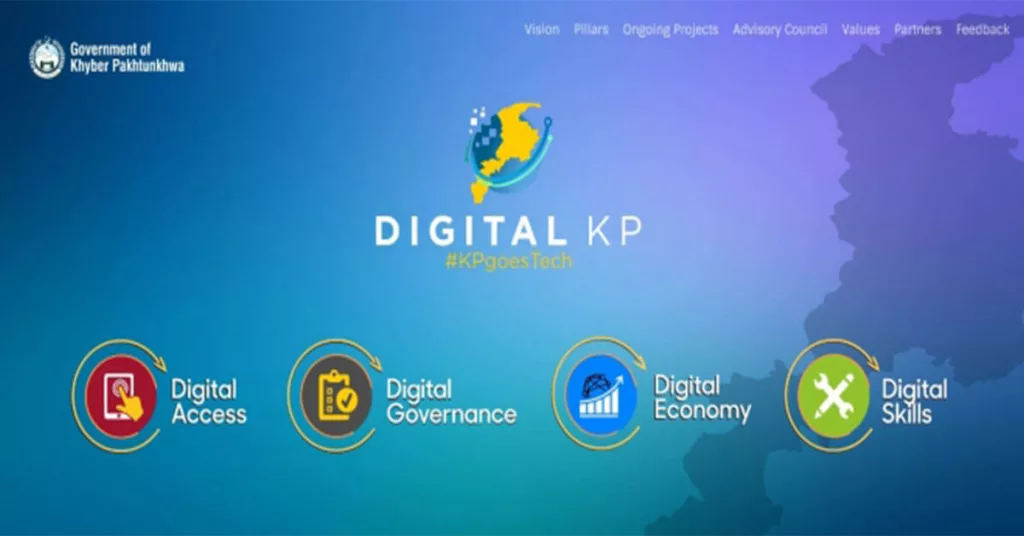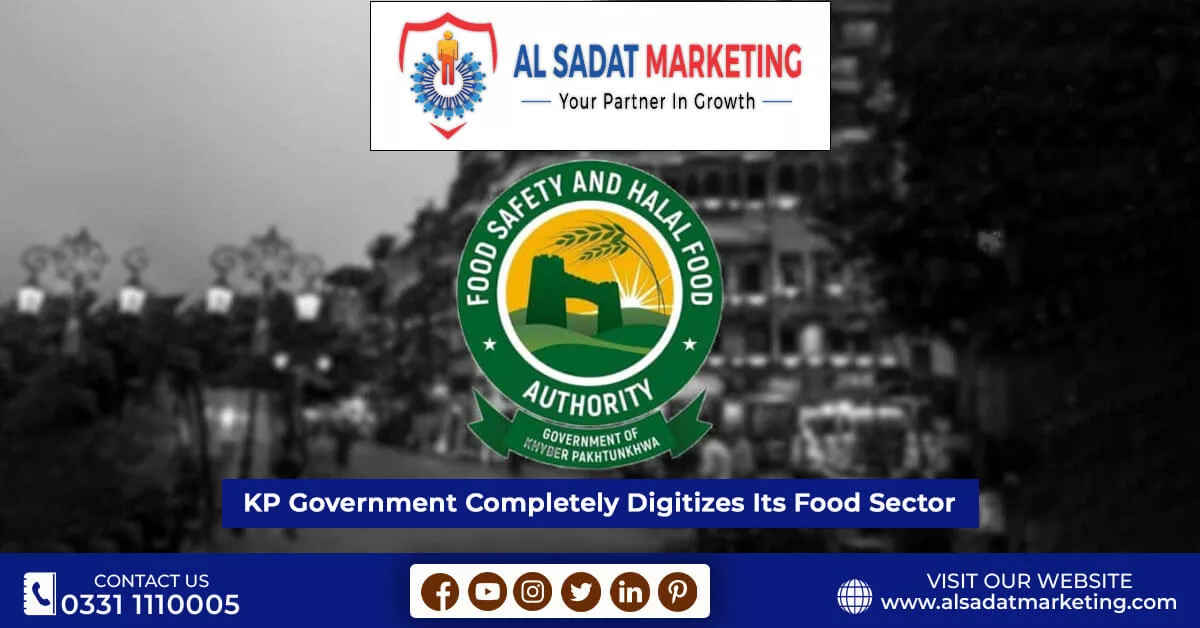KP Government Completely Digitizes Its Food Sector

Atif Khan, the Khyber Pakhtunkhwa (KP) Minister for Food, Science, Technology, Information Technology, and Sports and Youth Affairs, officially digitalized the provincial food department on Wednesday.
He pressed the start button at the food directorate after describing the breakthrough as a pivotal moment for the province’s food industry.
The minister, who spoke at the event, claimed that the intervention based on information and communication technology (ICT) is a complete mechanism to cover all sectors, from the management of storage facilities to fleets, as well as the e-inspection processes.
The government may now quickly access data, such as details of wheat stock, for decision-makers with just one click.
He continued by outlining how the KP administration is using the digitization of the system and ICT intervention to correct record flaws and anomalies.
The new method would transform manual bookkeeping into an online database and provide the authorities with immediate access to each warehouse’s records.
According to Mushtaq Ahmad, the food department’s secretary, the supply chain management system (SCMS) would also be a part of the digitization. It will be feasible to predict how much wheat the province will need in the future and to determine if the wheat supply was obtained locally or through import. It will also keep track of a list of suppliers and buying groups.
The Fleet Management System (FMS) will be used by the province to keep track of the fleet contractors and vehicles it uses. No matter where any particular car may be at any given moment, the system will track it in real time.
Similar to this, by developing dashboards for relevant parties who give regular interval data, the Statistical Branch Management (SBM) system will assist in decision-making.
The Laboratory Management Information System (MIS), which is used by the KP Food Safety and Halal Food Authority’s mobile and stationary labs, will help to eliminate human error in food testing.
All laboratory testing apparatus will be directly connected to the central MIS, which will get the findings of each food sample test right away.
The data will enable the food authorities to spot the most contaminated foods and detect patterns of food adulteration.
The new approach will also incorporate food department regulatory checks, according to Secretary Ahmad.
As part of the E-Inspection process, every field employee will be expected to submit daily inspection reports using a specific mobile application. The employees will be able to issue challans electronically, but the offenders will still pay the challan charge directly to the bank.
KP Rapidly Moving Toward Digital Transformation
In 2018, Khyber Pakhtunkhwa released “Digital KP,” a comprehensive digital plan that includes a program on digital development with a primary goal of promoting youth involvement in the digital economy. A significant portion of this larger digital strategy is devoted to encouraging young job creation.
KP has made considerable progress toward expanding its digital economy while also preparing itself to go into the next phase of digital governance. It has a practical roadmap for digital governance that takes into account the essential elements of any such framework, and it places a strong emphasis on developing the skills of its youth to create a future workforce that is competitive.
Its roadmap, whether analyzed locally or globally (using best practices and indicators), provides a workable strategy that can be implemented, and the Khyber Pakhtunkhwa Information Technology Board (KPITB) is doing just that.

The Paperless Government Initiative
The Paperless Government Initiative was the subject of the first contract that was signed. In the Khyber Pakhtunkhwa province, the Paperless Government project is a significant step toward digital governance and the first of its type in Pakistan. 170 procedures have been identified for digitization as part of this project’s thorough Business Process Review effort.
To eliminate paper from communication and file sharing within and among government departments, a Document Workflow Management System (DWMS) will be created. The adoption of this initiative will undoubtedly guarantee increased accountability, efficiency, and transparency in how the government conducts its business. All 32 of the KP Government’s administrative departments and their corresponding affiliated formations will be included in this project. The project is the result of the KPITB, Finance Department, and World Bank working together.
Establishment of a Special Technology Zone
The second agreement was inked between KPITB and National Logistics Cell (NLC) to develop Pakistan Digital City in Haripur as the first STZ of Khyber Pakhtunkhwa and the first purpose-built STZ of Pakistan. Once it is fully populated, it is anticipated that up to 20,000 direct, indirect, and induced jobs would be created, contributing an estimated 150 million USD to the economy. The project was lauded as crucial for boosting ICT exports and adding value to the nation’s digital economy in a variety of ways.
The Citizen Facilitation Initiative
The Government to Citizen (G2C) facing services that can be improved via the use of technology are a crucial component of a digital governance framework. The fourth agreement between KPTIB and NADRA to build citizen facilitation centers in Khyber Pakhtunkhwa was signed when more than 30 citizen-facing services were already being digitalized. As soon as the services are digitalized, they will be accessible through a single integrated platform (web-based and mobile application) and under a single roof in the actual citizen facilitation spaces located all around the province.
Establishment of Science Museum in KP
The Directorate of Science and Technology (DOST) and GSK Consultants signed the fifth agreement to establish a cutting-edge science museum in Khyber Pakhtunkhwa Province. This museum will play a significant role in promoting the science and technology sector in the province and encourage young people to become interested in and explore the many opportunities offered by technology.
Nanodegree Program With Udacity
KPITB also signed a partnership with Udacity, a pioneer in the market for providing competitive, market-ready digital skills through its widely respected nano degree program. The program will begin in July 2022 and aims to teach young people high-caliber skills. Udacity is debuting its program in Pakistan in association with a public body for the first time. Through a video message played during the ceremony, the CEO of Udacity shared his delight about launching the program with KPITB and highlighted previous successful collaborations with other governments.
You can also invest in other famous and most in demand housing societies, such as , Blue World City, Rudn Enclave, 7 Wonders City Peshawar, Taj Residencia, Kingdom Valley, New Metro City Gujar Khan, Forest Town Rawalpindi, University Town Rawalpindi, ICHS Town, Park View City Islamabad, Multi Gardens B17 Islamabad and Nova City Islamabad.
Al Sadat Marketing please contact 0331 1110005 or visit https://alsadatmarketing.com/
Few more real estate housing schemes which are trending now a days in Islamabad by including: Faisal Town Phase 2, Prism Town Gujar Khan, New City Paradise, Eighteen Islamabad, 7 Wonders City Islamabad, Capital Smart City, Silver City Islamabad, The Life Residencia, Faisal Town Islamabad, Islamabad Golf City, Islamabad Model Town and Marble Arch Enclave.
Al Sadat Marketing is an emerging Real Estate Agency headquartered in Islamabad, Pakistan. With over 10+ Years of experience, Al Sadat Marketing is providing its services and dealing all trending housing societies projects in different cities of Pakistan. Islamabad Projects, Rawalpindi Projects, Gujar Khan Projects, Burhan Projects, and Peshawar Projects etc.
Book Your Plot Now: +92 331 111 0005










